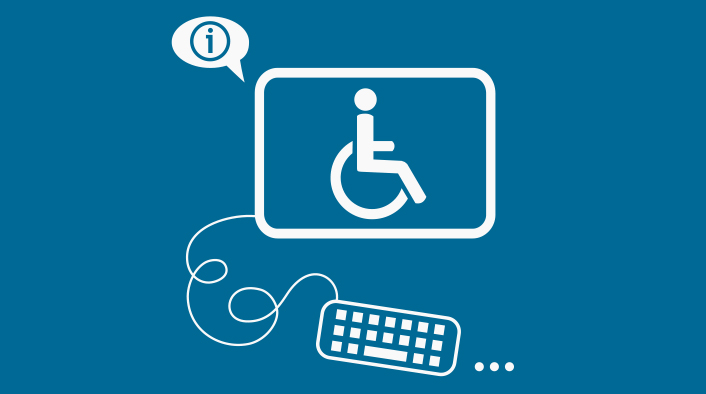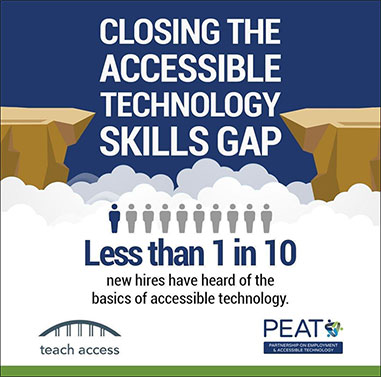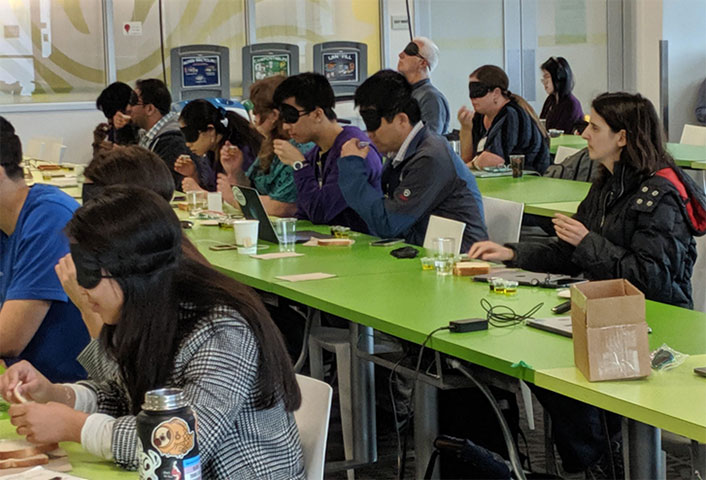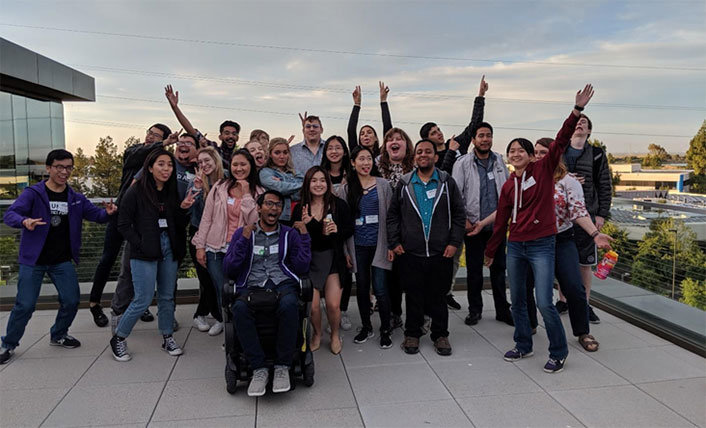Teach Access offers networking and experiential learning opportunities for students and curriculum development grants for faculty to help address gaps in accessibility technology skills in the workforce and move accessibility into the mainstream.

Great ideas often come about in response to a need.

For years, tech employers have grappled with the difficulty of finding new hires who have even basic knowledge and skills related to accessibility. According to the Partnership on Employment and Accessible Technology (PEAT), today's students are not learning the skills they need in order to make technology usable by everyone, including people with disabilities. Companies such as Adobe, Apple, Facebook, Google , Intuit, Microsoft, Oracle, Walmart, and Verizon Media report that they are actively seeking to recruit people to create accessible products but are unable to find appropriately trained talent. A recent report from PEAT indicates that 63% of companies say that their current staff lacks sufficient accessible technology skills and 93% say that the demand for accessibility skills will only increase in the future.
Driving Innovation to Meet Industry Needs
To address this knowledge and skills gap, Teach Access was launched in 2015 by several companies—Adobe, Facebook, Google, HP, Intuit, LinkedIn, Microsoft, The Paciello Group, and Verizon Media (originally Yahoo!)—and by founding academic institutions—California State University Northridge (CSUN), Michigan State University, Olin College of Engineering, Rochester Institute of Technology, Stanford University, University of Colorado, University of Michigan, and University of Washington. Teach Access founding member Larry Goldberg, Senior Director and Head of Accessibility at Verizon Media, said that the organization's mission is "making sure that our next generation of technology is born accessible."
To achieve this, Teach Access focuses on four core initiatives:
- Enhanced higher education curricula
- Academic leadership
- New accessibility-focused learning tools
- Changes to corporate hiring practices
Study Away Silicon Valley
Teach Access's Study Away Silicon Valley is an essential component of this mission. Laura Allen, Google's Senior Program Manager for Chrome and Chrome OS Accessibility, and Kate Sonka, Executive Director of Teach Access, created Study Away in 2018 to engage students in the drive to make accessibility a priority and to offer them the opportunity to see career paths in accessibility. Study Away has two primary goals:
- to grow a much-needed workforce with accessibility skills, and
- to create a network of accessibility advocates and champions.
This unique experiential learning program joins students, faculty, and Silicon Valley tech companies, providing participants the opportunity to build and expand their professional networks, explore career paths in accessibility, and gain an understanding of the local Silicon Valley culture and workspace. Study Away focuses on increasing both the level of accessibility skills and the awareness of accessible technology design and development among undergraduate and graduate students at participating universities.
Each year, students from across the country are selected to participate in the six-day program (see the "Supporting Study Away" sidebar for funding details). To participate, students must be attending one of the Teach Access member institutions, which nominate and select the program participants. Study Away is currently limited to 25–30 students, which helps ensure that participants receive focused attention. Study Away provides these students with a unique opportunity to immerse themselves in an environment focused on accessibility skills, with guidance from both higher education and tech industry Teach Access partners. One student who participated in the inaugural Study Away program in 2018 said, "As a result of this program, I realized how much companies actually care about this topic and how important it is to include early in the design process."
Supporting Study Away
The Study Away program itself and some incidental fees—such as rental cars for faculty participants—are funded via Teach Access's operating budget. The student participation fees vary by university; students at some institutions cover the program fees themselves, while other institutions cover students' program costs through endowments, grants, or scholarships. Some institutions offer credit for the program, and in those cases students enroll in and pay tuition for a course that includes and extends beyond Study Away. Faculty and industry partners generously volunteer their time, while host companies cover most meals and snacks.
The second annual Teach Access Study Away program was held in May 2019 in Silicon Valley. Compared with the first-year participants, this year's students came to the Study Away program with an even higher level of accessibility awareness. The group included undergraduate and graduate students with a range of knowledge; this raised the bar and helped to up-level the questions asked and spark interesting conversation throughout the week.
While the majority of this year's 2019 Study Away student participants were design/user experience or computer science majors, this year also included students majoring in marketing, psychology, and other subjects. The 2019 program also had an increase in Teach Access faculty member participation, with faculty from seven member institutions, up from four institutions in 2018.
Program Outline
Each day of the Study Away program, students visited a different industry partner to gain an understanding of the various approaches to, and innovations around, accessibility. These visits and other program outings provided students with the opportunity to engage in substantive conversations with accessibility professionals. For example, upon arrival, Study Away 2019 participants could opt to visit San Francisco's LightHouse for the Blind and Visually Impaired. Participating students toured the facility and were introduced to tools and technologies that the community leverages. Students found the visit valuable and said it enhanced their experience of the Study Away program.
The official Study Away program began the next day at Walmart eCommerce in Sunnyvale. There, students learned about Walmart's journey to accessibility, attended an "ask me anything" session with Walmart leaders, and received an overview of the week's planned agenda and activities.
On day three, the group visited Google headquarters in Mountain View for an introduction to Google accessibility. The morning was filled with presentations about accessible design and UX research, as well as a fireside chat with a recent graduate from a Teach Access university who now works on accessibility at Google. Students also participated in hands-on demonstrations of Google accessibility products and features and had the opportunity to talk with the engineers and product managers who helped build them. The day at Google concluded with an interactive experience led by Hoby Wedler, cofounder of Senspoint Design, who introduced the topic of sensory design. Following his presentation, he held a blindfolded olive oil and vinegar tasting to help students think creatively about sensory experiences and accessibility (see figure 1).

On the fourth day, participants visited the Verizon Media campus in Sunnyvale, where team members shared their paths to accessibility-focused careers. Next, the students toured the TV Studio and Control Room and interviewed each other on Verizon Media's TV set while their words were real-time captioned. The group then headed to Intuit in Mountain View for a tour and overview of that company's accessibility space (see figure 2), followed by a casual dinner with other key members of the Bay Area Accessibility and Inclusive Design meetup group.

Day five began at LinkedIn's offices, where Microsoft hosted its portion of the program, beginning with an overview of Microsoft accessibility and a discussion about the company's structure. From there, Microsoft led various product demos—including Seeing AI, Learning Tools, Office, and Code Jumper—and a Q&A session. The group then drove to Cupertino to visit Apple headquarters. Following a tour and an overview of how Apple approaches accessibility, participants had refreshments and mingled with members of the Apple accessibility team.
On the final day, the group visited Facebook headquarters in Menlo Park. The morning consisted of a tour of Facebook's campus and culture, followed by a brief presentation on its approach to accessibility and a career panel with members of the Facebook Accessibility team.
Hands-On Learning and Group Projects
Teach Access's intent is to make the Study Away experience as interactive as possible. To give students a hands-on opportunity to play a role in improving access for people with disabilities, Teach Access developed and incorporated a group-project component to Study Away. Prior to the Study Away week, the students received the overall project goals and suggested topics, which ranged from developing specific accessible technologies to creating proposals for generating large-scale societal systems in support of accessibility. From there, the students chose their project focus areas and worked throughout the week with their group project cohorts to prepare a presentation that each group delivered at the end of the program. Project time also provided an opportunity for students to build their professional networks as they interacted with students from various universities.
Among this year's group projects were
- an application idea for Google Home and other voice assistants to aid individuals with memory loss;
- a redesigned prototype of the game 2048 to make it compatible with a screen reader and improve the UI for those who are colorblind;
- an emoji definition library app to assist users with intellectual disabilities and/or gaps in cultural awareness to better understand and identify the meaning of certain emojis; and
- a social media campaign designed to encourage people to be aware of accessibility needs in the world around them and to become advocates for accessibility.
Students presented their final projects to participating Teach Access university faculty and tech industry representatives for feedback. The student presentations were well received, and industry members were impressed by the level of creativity and innovation students demonstrated in their project design, as well as the professionalism they exhibited in their presentations.
Bringing Study Away Experiences Home
Study Away has been a huge success in providing students the opportunity to experience firsthand the relevance of accessibility knowledge and skills to career paths in technology. At the end of this year's Study Away week, we asked students which activities, events, or initiatives they would envision themselves bringing back to their campuses. Students responded enthusiastically:
- "I would actually like to start small by introducing presentation accessibility to my professors and peers in classes, and then work up to talking to my computer science peers about how to incorporate and pay attention to accessibility in their coding practices."
- "I can begin designing my own interfaces to work with disabled audiences and read through my sites with a screen reader."
- "I have already hosted events on campus regarding discussing accessibility in [computer science] and beyond, and now I hope to take the knowledge and experience from this week and apply it to future events."
Faculty Grants for Curriculum Development
While Study Away inspires students to return to their universities and function as informal ambassadors for accessibility initiatives, it is colleges and universities themselves that must provide the foundation of knowledge and skills critical to foster students' interest in and ability to pursue careers in accessibility or fields in which accessibility skills are required.
To this end, Teach Access launched the Curriculum Development Awards program in 2018, awarding twenty grants to faculty members across the United States. These funds, which supplement the recipients' current coursework to integrate accessibility principles and skills, were provided by the Reader's Digest-Partners for Sight Foundation, The New York Community Trust, and corporate members of Teach Access.
To expand the impact of these faculty grants, award recipients are required to present their work at appropriate venues within their institutions. They are also encouraged to share their innovations and present their work at conferences, symposia, and workshops. Teach Access maintains a database of awardees' newly enhanced curricula, including detailed information on the development and presentation of the material. The Teach Access team will make course materials broadly available as open educational resources (OER) this fall.
Current grantees have enhanced curricula in coursework such as Human-Computer Interaction and Art, User Experience/User Interface Design, Intro to E-Learning and Perception, and Design & Accessibility. They have also
- created websites to curate materials that their fellow faculty members can employ to improve their knowledge and teaching of accessibility principles;
- conducted internal bootcamps on accessibility for fellow faculty; and
- presented their course developments at key events, including the 2019 CSUN AI Jam in Accessibility, Boise State University's Success Through Access Conference, and the Rocky Mountain Psychological Association teaching conference.
Teach Access also collects data on student responses to the enhanced coursework of faculty grantees by surveying students before and after their participation in those courses. Students' knowledge of and skills around accessibility are clearly improving as a result of this curricular development.
Expanding Its Reach
Teach Access membership continues to grow. Since 2015, industry and academic membership has expanded, and a full list of Teach Access members is available on the Teach Access Supporters & Contributors page [https://teachaccess.org/about/supporters-and-contributors/].
Teach Access believes that technology is integral to our culture, our society, and our workplaces and that it should be usable by everyone, regardless of their abilities or disabilities. Through its partnerships with industry, higher education, advocacy organizations, and the student community, Teach Access is leading the way toward a world in which accessibility is mainstream.
Liz Kagan is a consultant with Wheelhouse Group, which provides support to Teach Access via a contract with the US Department of Labor's Office of Disability Employment Policy.
Kate Sonka is the Executive Director of Teach Access and the Assistant Director of Academic Technology for the College of Arts & Letters at Michigan State University.
Lauren Rabb is a consultant with Wheelhouse Group, which provides support to Teach Access via a contract with the U.S. Department of Labor's Office of Disability Employment Policy.
Laura Allen is the Senior Program Manager for Chrome and Chrome OS Accessibility at Google.
Jeff Wieland is the Director of Accessibility at Facebook.
© 2019 Liz Kagan, Kate Sonka, Lauren Rabb, Laura Allen, and Jeff Wieland. The text of this work is licensed under a Creative Commons BY 4.0 International License.
